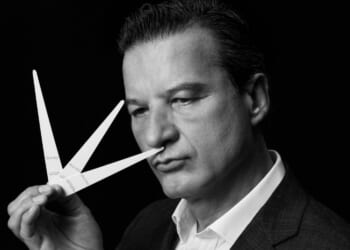DON’T BE DISTRACTED — FOCUS ON WHAT HILLARY CLINTON DID. There’s a house-of-mirrors quality to the newly-declassified annex from special counsel John Durham’s investigation of the investigation in the Trump-Russia matter. What is true? What is genuine? What does it mean?
There’s a simpler way to read it: Just focus on what we know the Hillary Clinton campaign actually did in the 2016 presidential campaign against Donald Trump. Leave speculation and judgments of motive out of it.
The best way to do that is to start not with the Durham annex but with the actual Durham report, which was released in 2023. In it, Durham discussed what he called the “Clinton Plan intelligence,” that is, his discovery that U.S. intelligence learned about what Russian intelligence learned — yes, it’s complicated — about an alleged Clinton campaign plan to accuse Donald Trump of collusion with Russia.
This is perhaps the most important paragraph in Durham’s 306-page report. It’s worth reading carefully:
The Clinton Plan intelligence itself and on its face arguably suggested that private actors affiliated with the Clinton campaign were seeking in 2016 to promote a false or exaggerated narrative to the public and to U.S. government agencies about Trump’s possible ties to Russia. Given the significant quantity of materials the FBI and other government agencies did in fact receive during the 2016 presidential election season and afterwards that originated with and/or were funded by the Clinton campaign or affiliated persons (i.e., the Steele Dossier reports, the Alfa Bank allegations, and the YotaPhone allegations), the Clinton Plan intelligence prompted the [special counsel’s] office to consider (i) whether there was in fact a plan by the Clinton campaign to tie Trump to Russia in order to “stir up a scandal” in advance of the 2016 presidential election, and (ii) if such a plan existed, whether an aspect or component of that plan was to intentionally provide knowingly false and/or misleading information to the FBI or other agencies in furtherance of such a plan.
This is what we know, as outlined in the Durham report. On April 1, the Democratic/Clinton law firm Perkins Coie hired Fusion GPS, an opposition research term, which in turn hired former British spy Christopher Steele to investigate allegations of Trump ties to Russia. Steele was also a CHS, or confidential human source, for the FBI, going back several years.
On June 14, 2016, there were media reports the Russians had hacked the Democratic National Committee. On July 22, the Friday before the Democratic National Convention was scheduled to begin on Monday, stolen DNC emails were published in the press, causing embarrassment to the Democratic Party. (The emails showed clearly that Clinton and the party had worked to undermine rival Bernie Sanders.)
On July 24, Clinton campaign manager Robby Mook took to the Sunday shows to claim that Russia was behind the DNC hack — a lot of people were saying that — and further, that “experts” were saying “this was done by the Russians for the purpose of helping Donald Trump.”
Mook had no evidence to support his charge. “It was a remarkable moment,” the New York Times reported the same day, July 24. “Even at the height of the Cold War, it was hard to find a presidential campaign willing to charge that its rival was essentially secretly doing the bidding of a key American adversary. But the accusation is emerging as a theme of Mrs. Clinton’s campaign….” With that, the effort to smear Trump as a “Russian asset” was off and running.
But smearing your opponent is part of politics, however unsavory. What if what Clinton did was just opposition research? “Steele was hired by Fusion GPS to essentially conduct opposition research against then-candidate Trump in the midst of a U.S. presidential election,” the Durham report notes. “While many may find this practice unseemly, political opposition research is a firmly entrenched feature of U.S. electoral politics.”
On the other hand, what if the Clinton team went beyond oppo research? That is what Durham was getting at when he wanted to know if Clinton’s plan was to “intentionally provide knowingly false and/or misleading information to the FBI or other agencies.” That’s more than just opposition research.
The answer is in the Durham report, with new details provided by the Durham annex. Among those new details is that the FBI received from a secret source a Russian communication from early March saying that Clinton’s staff was “preparing scandalous revelations of business relations between Trump and the ‘Russian Mafia.’” That certainly lines up with the campaign’s hiring of Christopher Steele and the plan to tie Trump to Russia.
Then we learn, from another Russian communication provided by the secret source, that on July 26 — remember the leaked emails were made public on July 22 and Mook made his accusation on July 24 — Clinton “approved a plan proposed by one of her foreign policy advisers … to ‘smear Donald Trump by magnifying the scandal tied to the intrusion by the Russian special services in the pre-election process to benefit the Republican candidate.’”
Democrats and their allies in the media immediately pronounced that information fake. Durham’s investigators, experienced prosecutors, felt otherwise. But leave that question unsettled. Focus instead on what we know, from the Durham report, and now from the Durham annex, about what Clinton actually did. Consider five data points:
1) By April, 2016, the Clinton campaign already had a contractor — Steele — working on developing damaging information on Trump and Russia.
2) By July 24, the campaign was publicly raising the charge of Trump-Russia collusion, and the New York Times reported the topic was “emerging as a theme of Mrs. Clinton’s campaign.”
3) Also in July, Steele contacted an FBI agent and “requested an urgent meeting,” according to the Durham report. There Steele gave the FBI one of his first reports. It alleged, famously, that “Russian authorities had been cultivating and supporting US Republican president candidate Donald Trump for at least five years,” an operation that was “both supported and directed by Russian President Vladimir Putin.” It also alleged, infamously, that Russian spy cameras had recorded “Trump’s (perverted) conduct in Moscow” including “employing a number of prostitutes to perform a ‘golden showers’ (urination) show in front of him.” That was the salacious and wildly false allegation that later became known as the “pee tape.” It is without any doubt an example of the Clinton campaign, working through its contractor Steele, providing “false and/or misleading information to the FBI or other agencies.”
4) After July, Steele worked hard to funnel his anti-Trump material into the media. For journalists, the dossier’s unsupported gossip would be legitimized by the fact that the FBI was investigating it.
5) In September, a Democratic lawyer working on behalf of the Clinton campaign, Michael Sussmann, planted a false allegation about Trump and Russia — the so-called Alfa Bank story — with the FBI. At the time, Sussmann denied he was acting for the Clinton team, even though he billed the campaign for the outreach to the FBI.
In light of that, look at Durham’s two questions: “(i) whether there was in fact a plan by the Clinton campaign to tie Trump to Russia in order to ‘stir up a scandal’ in advance of the 2016 presidential election, and (ii) if such a plan existed, whether an aspect or component of that plan was to intentionally provide knowingly false and/or misleading information to the FBI or other agencies in furtherance of such a plan.”
The answer to (i) is yes, there was a plan. The answer to (ii)? Well, there is no question that the Clinton campaign provided false and/or misleading information to the FBI. Whether it did so knowing the information was false and/or misleading is still a point of argument, at least among Democrats. In light of the entirety of what is now known, it seems extremely hard to believe the campaign did not know its feeds to the FBI were false and/or misleading.
Still, in the most basic sense, we know what Hillary Clinton did. It wasn’t just opposition research. She and her campaign team accused Trump of collusion and then fed false and/or misleading information relating to that accusation to the FBI, after which it became the subject of alarmist reporting in the press. In the short run, it didn’t work — Clinton lost and Trump won. But in the long run, it upended American politics for years, and no one is the better for it.















